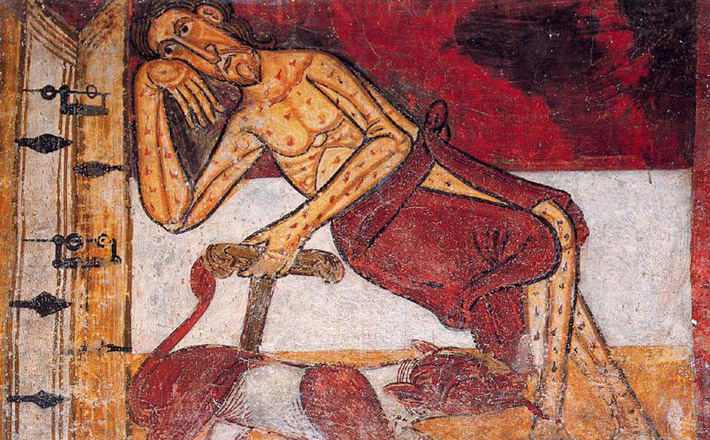Commentary on Jeremiah 32:1-3a, 6-15
It is said that hope springs eternal.
There are times, however, when hope is hard to find. Where is the hope when the dread of war is reality? Where is the hope when the lone voice of the one God commissioned to bring hope is locked away in prison? Where is the hope when leaders mistake painful words for words of hopelessness?
This is the situation in today’s text. Babylon has overtaken Jerusalem leaving a trail of death and destruction in its path. Jeremiah, the prophet whose job it is “to pluck up and to pull down, to destroy and to overthrow, to build and to plant” is imprisoned, silenced within the walls of the king’s palace. The king, King Zedekiah, is too shortsighted to understand that Jeremiah’s word of warning is a blessing in and of itself.
Sometimes, especially in the worst of times, hope comes from unexpected places and is visible only to those who have the “eyes to see.” Many would see the offer to buy land in a time such as this simply as a way to rid oneself of an unwanted financial responsibility. After all, owning land “seem[ed] pointless to buy property when the entire population is about to be killed or deported.”1 Jeremiah, on the other hand, understood his cousin’s offer to be a sign of hope and expectation for future blessing. Since God had told him to expect his cousin to make the offer, Jeremiah saw it as a sign that God would reverse Israel’s fortunes. He saw it as a sign that God had neither forgotten Israel nor left it to its own devices.
Commanding that the deeds be put in clay pots, Jeremiah took steps necessary to assure that the deeds of purchase would outlast war and destruction. Even today, it is a joyous occasion and a newsworthy event when a cache of ancient documents is found. For example, Israel’s national library announced its purchase of thousand-year-old “writings in Hebrew, Aramaic, Judea-Arabic and … Judeo-Persian”2 found in caves in northeast Afghanistan was international news.
Years earlier when Israel settled in the Promised Land, priests and Levites were forbidden to own land. Instead, they were given “fields around the towns that had been allocated to them.”3 These properties were to remain in the hands of close relatives.4 “Crops [could be planted and] harvested”5 but never sold outside the family. This restriction was designed to “prevent a family losing its land and … [being] reduced to poverty.”6
Jeremiah made sure that he followed all of the prescribed legal procedures, including having it witnessed publicly. With the transaction in public view, Jeremiah was also conducting a “sermon” for all to see. It was a way of expressing his hope, his desire, his trust in God, that things would indeed get better, even if he did not live to experience better.
Where is the hope when the addict has lost her way, when the family has lost its connection, when the gambler has lost it all? Where is the hope when changes in the economy result in an unwanted layoff? Where is the hope when failing health signals that life will go on, but it will never be the same? What do you do when you know there’s light at the end of the tunnel, but for the life of you, you can’t see it? What do you do when it seems that what is broken can never be healed, can never be fixed?
Sooner or later, the one whose heart is broken must step out in faith if there is to be any healing, any movement forward into the new “future story.”7 The addict must seek treatment. The family can choose love, even in divorce. The gambler can choose to make different financial decisions. The employee with a pink slip can find a new career. Failing health can lead to a new way of life. The one looking for light at the end of the tunnel can choose to move forward, confident that the light is there, even in the darkness. The one whose heart is broken can trust that God will heal.
For Jeremiah, that act of faith meant buying a plot of land. It must have taken must faith. It must have taken much courage to purchase land that had been upended by war, especially since he expected a long road to peace. Seventy years is a long time and Jeremiah likely would not live to reclaim the land. His purchase was not just for himself, but for future generations. His purchase signaled the nation that the one who brought warning of destruction was also one who believed in restoration.
Scripture does not tell us what happened to Jeremiah or to the land, except to say that despite warning against it, Jeremiah was compelled by some in his community to go to Egypt. Many years later, under the leadership of Ezra and Nehemiah, the exiles would return to reclaim and rebuild the nation and its temple.
Paul too knew the importance of living by faith. He would write in 2 Corinthians 5:7 “for we walk by faith, not by sight.” Paul and Jeremiah, their words speak volumes, even today. Jeremiah’s purchase of land still stands as a testimony of what faith and hope in God can do. Even in the worst of times faith and hope can be found if only we have “eyes to see.” Like Paul, like Jeremiah, it is incumbent for all to know that hope does indeed spring eternal.
Notes:
1 Issiaka Coulibaly, Jeremiah” in Africa Bible Commentary: A One-Volume Commentary Written by 70 African Scholars, ed. Tokunboh Adeyemo (Grand Rapids: Zondervan, 2006), 896.
2 Mario Ledwith “Collection of ancient Hebrew manuscripts discovered in Afghanistan provide evidence Jewish people lived in country 1,000 years ago” http://www.dailymail.co.uk/news/article-2256870/Hebrew-documents-Taliban-stronghold-reveal-evidence-Jewish-communities-living-Afghanistan-1-000-years-ago.html (accessed March 15, 2016).
3 Coulibaly, 896.
4 Ibid.
5 Ibid.
6 Ibid.
7 Lester, Andrew D., Hope: Pastoral Care and Counseling (Louisville: Westminster John Knox Press, 1995).


September 25, 2016